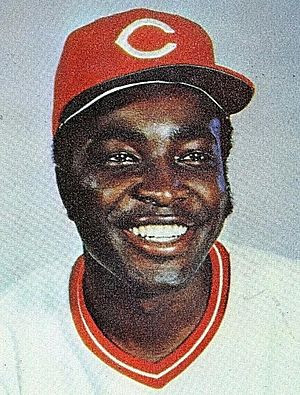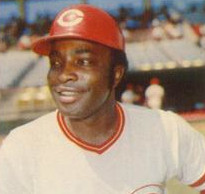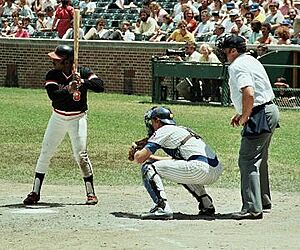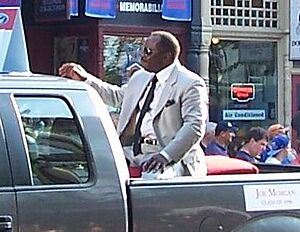Joe Morgan facts for kids
Quick facts for kids Joe Morgan |
|||
|---|---|---|---|

Morgan with the Cincinnati Reds in 1972
|
|||
| Second baseman | |||
| Born: September 19, 1943 Bonham, Texas, U.S. |
|||
| Died: October 11, 2020 (aged 77) Danville, California, U.S. |
|||
|
|||
| debut | |||
| September 21, 1963, for the Houston Colt .45s | |||
| Last appearance | |||
| September 30, 1984, for the Oakland Athletics | |||
| MLB statistics | |||
| Batting average | .271 | ||
| Hits | 2,517 | ||
| Home runs | 268 | ||
| Runs batted in | 1,133 | ||
| Stolen bases | 689 | ||
| Teams | |||
|
|||
| Career highlights and awards | |||
|
|||
| Induction | 1990 | ||
| Vote | 81.8% (first ballot) | ||
Joe Leonard Morgan (born September 19, 1943 – died October 11, 2020) was an amazing American professional baseball player. He played as a second baseman for 22 seasons in Major League Baseball (MLB). He played for teams like the Houston Astros, Cincinnati Reds, and Oakland Athletics.
Joe Morgan won two World Series championships with the Cincinnati Reds in 1975 and 1976. He was also named the National League's Most Valuable Player in both of those years. Many people think he was one of the best second basemen ever. He was added to the Baseball Hall of Fame in 1990.
After he stopped playing, Joe Morgan became a baseball broadcaster. He worked for teams like the Reds and Giants, and for TV networks like ABC and ESPN. He also had his own radio show and advised the Reds.
Contents
Playing Baseball: Joe Morgan's Career
Joe Morgan was the oldest of six children. He was born in Bonham, Texas, and moved to Oakland, California, when he was five. People called him "Little Joe" because he was 5 feet 7 inches tall.
He was a great baseball player at Castlemont High School. But because of his size, no major league teams offered him a contract right away. He played college baseball at Oakland City College. Then, in 1962, the Houston Colt .45s signed him.
Starting Out with the Houston Astros
Joe Morgan played his first major league game on September 21, 1963. Even though he later won World Series and MVP awards with the Reds, he said his first game was the most special.
Early in his career, Joe had a problem with his swing. His back elbow was too low. A teammate, Nellie Fox, gave him a funny tip. He told Joe to flap his back arm like a chicken at the plate. This helped Joe keep his elbow up, and the "chicken flap" became his famous move.
Joe played ten seasons for the Houston Astros. He hit 72 home runs and stole 219 bases. He was chosen as an All-Star in 1966 and 1970. In 1966, he broke his kneecap during practice. This made him miss 40 games.
The Astros wanted more power in their team. So, in 1971, they traded Joe Morgan to the Cincinnati Reds. This was a big trade involving many players.
Becoming a Cincinnati Reds Star
The trade that sent Joe Morgan to the Reds was a huge deal for Cincinnati. Many thought the Astros got the better end of the deal at the time. But Joe Morgan, along with other players like César Gerónimo and Jack Billingham, joined the Reds.
Joe Morgan became a key part of the "Big Red Machine". This was a famous team that won many games. He was an All-Star eight times in a row with the Reds (1972–1979). He had also been an All-Star twice with Houston.
Joe and his teammates, like Pete Rose and Johnny Bench, led the Reds to win two World Series championships. They won in 1975 and 1976. Joe Morgan even drove in the winning run in Game 7 of the 1975 World Series.
He was named the National League's MVP in both 1975 and 1976. He was the first second baseman in the National League to win the MVP award two years in a row. During these MVP years, he had a great batting average of .324. He also hit 44 home runs and stole 127 bases.
Joe Morgan was a very good hitter, especially when it mattered most. He also walked a lot, which meant he got on base often. He hit 268 home runs in his career, which was great for a middle infielder. He was also one of the best base stealers of his time.
Besides his hitting and running, Joe was an amazing fielder. He won the Gold Glove Award five years in a row (1973–1977). His shorter height actually helped him. He had a very small strike zone, making it harder for pitchers to strike him out.
Later Years in Baseball
Joe Morgan went back to Houston in 1980. He helped the Astros win their division. But they lost in the playoffs to the Philadelphia Phillies.
Next, Joe played for the San Francisco Giants for two seasons. In 1982, he hit a home run in the very last game of the season. This home run stopped the Los Angeles Dodgers from winning their division. He also won the Willie Mac Award for his great spirit and leadership.
In 1983, Joe joined the Philadelphia Phillies. He played with his old Reds teammates, Pete Rose and Tony Pérez. The Phillies made it to the 1983 World Series but lost. Joe finished his career with the Oakland Athletics in 1984. On his 40th birthday in 1983, he had a fantastic game with four hits, including two home runs.
After Playing: Hall of Fame and Broadcasting
Baseball Hall of Fame
In 1990, Joe Morgan was voted into the Baseball Hall of Fame. He received more than 81% of the votes on his first try. He was one of only a few players to be elected in their first year of eligibility.
In 2017, Joe Morgan wrote a letter to the Hall of Fame. He asked that players who cheated by using performance-enhancing drugs not be elected.
His Legacy in Baseball
After his playing career, Joe Morgan was honored in many ways. He was inducted into the Cincinnati Reds Hall of Fame in 1987. His jersey number, 8, was retired by the Reds. This means no other Reds player will wear that number. In 2013, the Reds put up a statue of Joe Morgan at their ballpark.
 |
|
| Joe Morgan's number 8 was retired by the Cincinnati Reds in 1987. |
Baseball expert Bill James called Joe Morgan the best second baseman in baseball history. He also said Joe was the "greatest percentages player." This was because he was great at fielding, stealing bases, and getting on base.
In 1999, The Sporting News ranked Joe Morgan as number 60 on their list of the 100 Greatest Baseball Players. He was also a finalist for the Major League Baseball All-Century Team.
Joe Morgan also helped the Baseball Assistance Team. This group helps former baseball players who are having money or health problems. He also served on the Board of Directors for the Baseball Hall of Fame.
Broadcasting Career Highlights
Joe Morgan started his broadcasting career in 1985 with the Cincinnati Reds. He also announced games for the San Francisco Giants and Oakland Athletics.
In 1986, ESPN hired him to call Monday Night Baseball games. He also called College World Series games.
From 1988 to 1989, Joe worked for ABC. He helped announce Monday Night Baseball and Thursday Night Baseball. He was even a field reporter for the 1989 World Series. He was on the field when the 1989 Loma Prieta earthquake hit!
From 1994 to 2000, Joe Morgan worked for NBC. He called three World Series and four All-Star Games with Bob Costas. He won two Sports Emmy Awards for being an outstanding sports analyst.
Joe Morgan was also a main announcer for ESPN's Sunday Night Baseball for many years. He also called League Championship Series and World Series games for ESPN Radio.
In 2010, Joe Morgan decided to step down from his role as an announcer for ESPN Sunday Night Baseball. He returned to the Reds as an advisor.
Personal Life
Joe Morgan married Gloria Stewart, his high school girlfriend, in 1967. They had two children. Later, he married Theresa Behymer in 1990, and they had twins.
In 2015, Joe was diagnosed with a blood disorder that turned into leukemia. He received a bone marrow transplant from one of his daughters. Joe Morgan passed away on October 11, 2020, at age 77.
See also
 In Spanish: Joe Morgan para niños
In Spanish: Joe Morgan para niños
- Bay Area Sports Hall of Fame
- Houston Astros award winners and league leaders
- List of Gold Glove middle infield duos
- List of Major League Baseball annual runs scored leaders
- List of Major League Baseball annual triples leaders
- List of Major League Baseball career doubles leaders
- List of Major League Baseball career hits leaders
- List of Major League Baseball career home run leaders
- List of Major League Baseball career runs batted in leaders
- List of Major League Baseball career runs scored leaders
- List of Major League Baseball career stolen bases leaders
- List of Major League Baseball career total bases leaders
- List of Major League Baseball single-game hits leaders
 | Janet Taylor Pickett |
 | Synthia Saint James |
 | Howardena Pindell |
 | Faith Ringgold |




